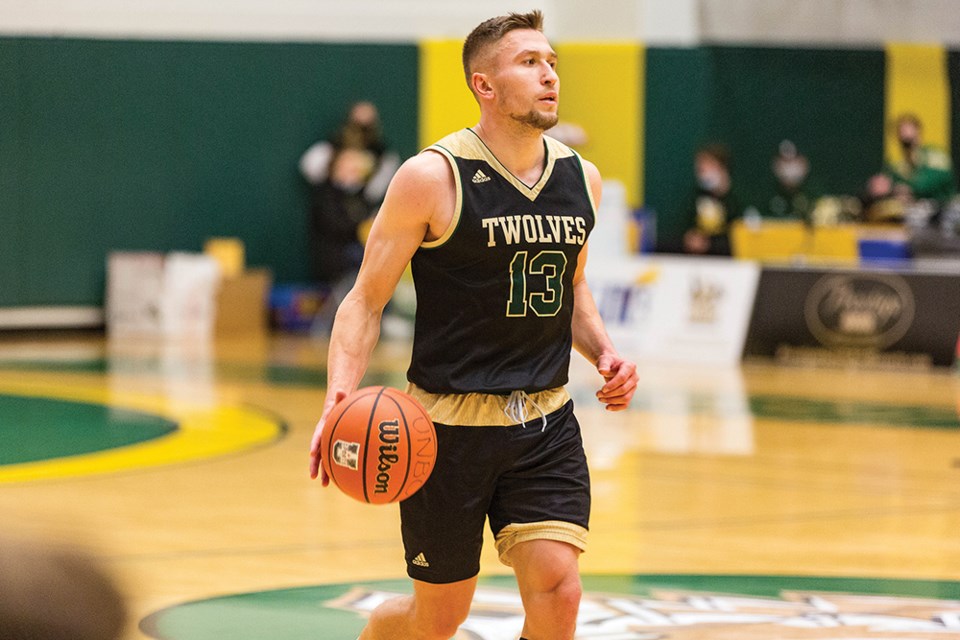The news out of the Ukraine was grim for Vova Pluzhnikov when the 26-year-old UNBC commerce student woke up to start his day Monday.
The Russian invasion of Ukraine that started Thursday continues to threaten Pluzhnikov’s homeland and his parents, brother, cousins and friends are getting caught in the crossfire. They live in Kharkiv, in northeastern Ukraine, and on Monday that city suffered intense rocket attacks from Russian forces that left dozens of people dead and hundreds injured in the second-largest city in Ukraine, with a population of 1.44 million.
“It was definitely the toughest day for Kharkiv today,” said Pluzhnikov. “Lots of shelling and unfortunately many casualties among civilians. Many of my friends from Kharkiv are very afraid right now. This irrational and unwarranted targeting of civilian structures and buildings by the Russian aggressors cannot be forgiven.”
Saturday at the Northern Sport Centre the T-wolves lost 89-69 to the first-place Victoria Vikes in the final regular season game for both teams and like he’s done throughout his five-season U SPORTS Canada West career, Pluzhnikov talked to his parents after the game.
“It’s just hard, every time I think about it,” said Pluzhnikov, while fighting back tears. ”They told me they were able to watch the game, but it’s not quiet over there. It’s very hot, and they’re just trying to stay low and stay safe, going back and forth between their apartment and a shelter nearby, so I try to stay in touch with them and my brother.”
Pluzhnikov’s cousin works as a baker and his bakery is helping to feed people displaced from their homes by the fighting nearby.
“He took his whole family down to his workplace and everyone is chipping in, everyone is trying to provide and they’re trying to supply the local military with everything they can make on the spot,” he said. “My brother and his wife try to provide IT support when it’s safe to be at the apartment, while my mom, cousin and his family make soup and make bread for volunteers and others in need. I couldn’t be more proud of my family and their contributions, especially right now, and the only message I have is just keep staying strong. We’ll go through this and we’ll definitely win.”
Pluzhnikov says his family would consider leaving the country, but not now.
“It’s really early to say right now, it’s really dangerous to do it,” said Pluzhnikov. “I’ve had many talks with my parents about it and right now is not the time. I think we just have to wait it out a little bit and see if it gets better. When it gets better then we can talk about it again.”
Before he came to Prince George to play basketball at UNBC, Pluzhnikov already had a degree in organic chemistry from the National University of Kharkiv and a year of masters studies completed. He’s finishing off his commerce degree at UNBC and plans to use that to pursue a career in marketing and sales. He will apply for permanent residency status and hopes to remain in Prince George with his family eventually joining him as residents of the city.
“That’s the goal, that’s always been the goal, and I’ll keep working towards that,” he said.
Russians at UNBC also upset about the war
The four Russians currently with the UNBC Timberwolves are all feeling the effects of the war in Ukraine.
Women’s basketball head coach Sergey Shchepotkin is from Volgogrod, the former Stalingrad, and his wife Alla Shchepotkina, a former T-wolves assistant coach, is from Ulyanovsk. Two of the starting T-wolves players on the women’s basketball team – Alina Shakirova and Svetlana Boykova - are from Moscow.
Zaporizhzhia, a city of 732,000 in southeasterm Ukraine, is home to one of Shchepitkina’s closest friends, the godmother of her and Sergey’s son Sam. On Saturday, Reuters reported Russian troops were approaching the city and were aiming rockets at its nuclear plant.
“She’s like a sister to me,” said Shchepotkina. “They can hear the bombs and everybody is scared.”
Like the rest of the world, she is shocked at the scale of the invasion and that it even happened at all.
“It’s a really hard situation and I would never ever imagine in my life this would happen,” she said. “It’s so sad. We have family in Moscow and we have really good close friends in Ukraine. Politics, I just hate it. It’s scary for everybody. I just can’t believe it.”
The conflict stems from the breakup of the Soviet Union and Ukraine becoming an independent country three decades ago and Russia’s interest regaining territory it lost when the 14 former Soviet republics declared sovereignty in 1991.
Shchepotkina became an adult before the breakup and grew up thinking of Ukrainians as fellow citizens of one big country. Close to 80 per cent of Russian citizens consider themselves ethnic Russians and similar demographics exist in Ukraine, where most of the people are of Ukrainian descent. People in Ukraine suffering from the attacks are wondering, in their words, “why our brothers did this to us?” For Shchepotkina, the Russian invasion and resultant loss of lives are impossible for her to accept.
“It’s more than brothers, it’s us, we are (the) same,” said Shchepotkina. “We don’t have newcomers, we don’t have immigrants, we are family. I’m from the last generation of Soviet Union and it was one country. My best friends are there. It’s so sad to see.”


